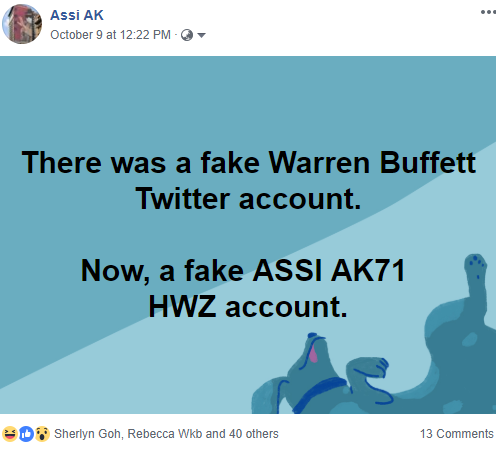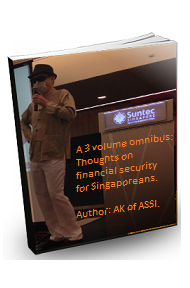UPDATED IN JULY 2018.
Very often, when people buy things, the thing they wonder about is whether they can afford it or how can they afford it?
Affordability should never be the main question.
Try these:
1. Is this necessary?
2. Is it value for money?
Simple questions.
Simple, right?
Simple to understand but not easy to do?
If we have the ability to do it, our will must be strong.
If we have the ability to do it and if we are serious about building wealth, don't squander it.
Always ask these two questions before we buy anything and, in all likelihood, we will be saving more money in future.
Related posts:
1. Three point turn.
2. Needs and wants.
3. If we are not rich, don't act rich.
PRIVACY POLICY
Featured blog.
1M50 CPF millionaire in 2021!
Ever since the CPFB introduced a colorful pie chart of our CPF savings a few years ago, I would look forward to mine every year like a teena...

Archives
Pageviews since Dec'09
Recent Comments
ASSI's Guest bloggers
- boon sun (1)
- Elsie (1)
- Elvin H. Liang (1)
- ENZA (3)
- EY (7)
- FunShine (5)
- Invest Apprentice (2)
- Jean (1)
- JK (2)
- Kai Xiang (1)
- Kenji FX (2)
- Klein (2)
- LS (2)
- Matt (3)
- Matthew Seah (18)
- Mike (6)
- Ms. Y (2)
- Raymond Ng (1)
- Ryan (1)
- Serejouir (1)
- skipper (1)
- Solace (13)
- Song StoneCold (2)
- STE (9)
- TheMinimalist (4)
- Vic (1)
Resources & Blogs.
- 5WAVES
- AlpacaInvestments
- Bf Gf Money Blog
- Bully the Bear
- Cheaponana
- Clueless Punter
- Consumer Alerts
- Dividend simpleton
- Financial Freedom
- Forever Financial Freedom
- GH Chua Investments
- Help your own money.
- Ideas on investing in SG.
- Invest Properly Leh
- Investment Moats
- Investopedia
- JK Fund
- MoneySense (MAS)
- Next Insight
- Oddball teen's mind.
- Propwise.sg - Property
- Scg8866t Stockinvesting
- SG Man of Leisure
- SG Young Investment
- Sillyinvestor.
- SimplyJesMe
- Singapore Exchange
- Singapore IPOs
- STE's Investing Journey
- STI - Stocks Info
- T.U.B. Investing
- The Sleepy Devil
- The Tale of Azrael
- TheFinance
- Turtle Investor
- UOB Gold & Silver
- Wealth Buch
- Wealth Journey
- What's behind the numbers?
Two questions which will help us build wealth.
Saturday, March 22, 2014Posted by AK71 at 5:05 PM 9 comments
Labels:
money,
money management,
savings,
wealth
Tea with Matthew Seah: The top 8% of the world's wealthy.
Son : Why are we not rich ?
Dad : Who says we're not rich ?
Dad :Being rich is not about how much you have , but how much you give .
Dad : Somehow when you give, you'll be happier .
Boy: *sulks, and after reflecting*, I wasn’t happy.
Watch this video:
In Singapore, the circumstance is such that many live from paycheck to paycheck and have no money or worse, they are in debt. These people will be thinking like the boy.
Let’s all show some beautiful display of free, gracious generosity.
1. Counting our blessings.
2. An appeal by AK71 for funds.
3. Ways to reduce income tax.
4. Make a donation to help needy students.
(Added on 8 Oct 15).
Posted by AK71 at 10:31 AM 3 comments
Labels:
donations,
Matthew Seah
Buy a bond fund that pays 7% a year?
Friday, March 21, 2014
UPDATED (December 2016):
In the last few years, I have been saying that we should avoid long term bonds and bond funds. Read comment dated 16 Dec 16 in the comments section at the end of the blog.
---------------------------------------
A banker has advised a reader, K, that he buys into a bond fund. This was what K wrote in his email to me:
Hi AK,
i read your post and i like your advise on bonds. im currently unemployed and i need a steady form of income for my family.
A citi banker suggested that i buy a fund that is comprised of bonds that pays abt 7 percent an annum.
please give me your opinion on such investment comparing to shares. since its little fluctuation and it gives me income
thanks
K
My reply:
Hi K,
Too little information for me to make an informed decision, unfortunately.
However, if I were to hazard a guess, for a basket of bonds to pay you 7% per annum, I guess these bonds are not of investment grade. They could be "junk" bonds. Risk level must be higher which explains a higher return.
A 10 year bond issued by the Singapore government has a coupon of 2.75%. Singapore has a AAA credit rating, of course. More recently, CapitaMalls Trust issued a 7 year bond that has a coupon of 3.08%. Of course, lending money to CapitaMalls Trust is riskier than lending money to the Singapore government. So, although the period is shorter, the coupon is higher.
I would suggest that you ask for more information and not just look at the 7% yield which the banker says you will get.
When we buy bonds, we are lenders, not investors.
So, when we lend money to a business, what should we do?
We want to study the business and the reason why they need to borrow money. Is the business strong and stable enough to pay the coupons and to redeem the bonds when the time comes?
So, what are the bonds which make up the bond fund? You should find out.
Best wishes,
AK
" If you are going to buy a bond mutual fund, you have to be very careful because if interest rates go up, the value of that bond mutual fund will go down. And, in a mutual fund, there is absolutely not maturity date.
"So, what are you thinking? The worst thing you could do with your money right now is put it into a bond mutual fund." - Suze Orman (Read related post no. 1 below)
Related posts:
1. Nobody cares more about our money than we do.
2. A banker's advice on retirement income strategy.
3. CapitaMalls Trust: Buy the retail bond or the REIT?
Posted by AK71 at 10:04 PM 20 comments
Labels:
bonds,
passive income
Tea with ENZA: What is "window dressing"?
 We often come across the phrase "window dressing" when we watch the business news on TV or read the "Money" section in the newspapers. What does it mean?
We often come across the phrase "window dressing" when we watch the business news on TV or read the "Money" section in the newspapers. What does it mean?
Does it mean buying some curtains and blinds for the windows in the buildings along Shenton Way?
Anyway, Solace, a guest blogger, asked that I put this question to ENZA and here is the reply:
Wow what a big question...
I assume your reader is asking about fund managers...
most fund managers do index hugging, only to what extend...
So, there will be some winner and loser in the holding... they will normally look at the trend and decide. Trend in the sense of macro view, for example REITs is not going to do so well this year, they hold less...
They will never sell everything unless it is necessary (such as liquidation of funds or market correction)
FMs will sell the loss making fund and liquidate some of the profitable (due to client withdrawal or portfolio balancing after the selling of loss-making funds) However, this generally apply to big funds...
smaller Fund house don't do that due to the scale of the funds. (capital loss are deem to be eligible for a tax reduction at year end filing)
And window dressing normally occur for FMs at every quarter end.
No windows involved. Definitely, no curtains and blinds too.
Related post:
Tea with ENZA: Explaining Mr. Market's behaviour.
Posted by AK71 at 9:00 PM 4 comments
Labels:
ENZA
Tea with ENZA: Explaining Mr. Market's behaviour.
Thursday, March 20, 2014
I chatted with a private banker on FB this evening and he shared some interesting stuff with me.
perhaps I know a little too much of how the inside job, so the more I m actually reluctant to share with the outsiders. because they don't know how to take advantage, but just make noise.
not the inside information, but more of how the institutional investor invest and how fund house and banks work... that's the big big thing coz we don't know why people do certain things and when price moves everyone panic etc...
an example is: sell in may and go away...
By using statistic, 32 out of 34 years actually proves to be true... But the thing is, why???
May is a summer period in Europe. They get 10% of monthly salary for summer holiday. So nobody would like to work during that period. institutional or retail, half of them would go for summer holiday.
So who is there to provide liquidity?? The remaining half. But before people go for holiday, they are worried about market fluctuation... so how to negate that, they hedge off or sell off... Market plunge...
That thing itself is actually a very common sense thing, but who would be able to link the entire picture until we are in the industry working...
Same thing for santa clause rally...
It seems like a simple thing, but those so called technical analysis bullshit to an extend people thought it is a kind of voodoo effect...
and of course the post-may period is a low period, few market data, few earning reporting release, TA guys get out of the fun... the entire duration is low volume and neither bull or bear...
When I suggested that I would like to share the above with readers in my blog, he said:
**send killer to hunt ASSI, burn the laptop and the house**
So, I am actually risking my life to share this here in my blog!
Kidding!
Don't worry because he finally agreed.
aahhh... ok ok go ahead and post ba hahaha
FB has allowed me to "meet" some really nice people.
Posted by AK71 at 9:50 PM 9 comments
Labels:
ENZA
Save 100% of your take home pay. What?
Wednesday, March 19, 2014
Oh my, is this another sign that AK is ageing?
Did he just say save "100%" of our take home pay?
Maybe he meant 10%.
Well, no, I really do mean 100%.
What?
AK is not only ageing, he is growing senile!
How is it possible to save 100% of our take home pay?
OK, assuming that we had a gross annual income of $50,000 and we took home $40,000 after CPF deduction, could we, at some point in time save $40,000 a year, assuming that our take home pay remains constant?
The answer is "yes".
How?
1. Save 50% of our take home pay each year. This amounts to $20,000.
2. If we invest to enjoy at least a 6% yield a year, in the second year, we would be able to save $21,200 or 53% of our take home pay.
3. Invest again to enjoy at least a 6% yield a year and in the third year, we would be able to save $22,472 or 56.18% of our take home pay.
Just keep repeating the process and the numbers are:
4th year, $23,820. 59.55%.
5th year, $25,249. 63.12%.
6th year, $26,764. 66.91%.
7th year, $28,370. 70.925%.
8th year, $30,072. 75.18%.
9th year, $31,877. 79.69%
10th year, $33,789. 84.47%.
11th year, $35,816. 89.54%.
12th year, $37,965. 94.91%.
OK, for those who are superstitious about the number 13, this is where you might change your mind.
In the 13th year, we would be able to save $40,243 or 100.6% of our take home pay.
Would you like that?
Of course, there are many things we can say about this blog post and being unrealistic is one of them.
For one, it is almost unthinkable not to get any increase in pay for over 13 years.
Also, it is quite possible that there could be a period of unemployment (or two).
Instead of being unrealistic, let us try being realistically optimistic instead.
If we should get an increase in pay, what should we do?
Maintain the same lifestyle, if possible.
Then, we would be able to save more and invest more.
So, for example, if our take home pay became $50,000 a year in the 5th or 6th year, we should save $30,000.
Of course, there will be things we can say about this being unrealistic as well.
What about the higher costs of living, for example?
What if we should start a family?
What if there should be unexpected expenses?
 |
| What about an emergency fund? |
Obviously, this blog post cannot take all circumstances into consideration and it has also dispensed with the consideration of having an emergency fund which, by the way, is very important to have.
All of us have different circumstances but I think we can all agree that the decisions in life, especially those which involve money, can either give us a boost or slow us down as we work towards a financially secure future.
Isn't it more important to get down to doing it and not keep thinking about how this is impossible and that it is unrealistic.
There are too many "what ifs" in the world.
For those who are still hanging on to the "what ifs", try this:
"What if this really works?"
Would we rather have a chance of making this work for us or not at all?
Now, if I have captured your imagination, let me add another dash of excitement.
Is there a possibility that at some point in time, we might save 200% of our take home pay?
Related posts (The prudent stuff.):
1. A common piece of advice on saving.
2. 5 points you ignore at your own risk.
3. Very first step to becoming richer.
Related posts (The scary stuff.):
4. Not enough money to be married.
5. From rich to broke?
6. Financially prepared to be married?
Posted by AK71 at 8:45 PM 25 comments
Labels:
investment,
money,
money management,
passive income,
savings,
wealth
Tea with Solace: A review of Saturday with Victor Chng.
Tuesday, March 18, 2014
Review on "Level Up Your Investment Profits"
I first knew about Victor Chng and Rusmin Ang when I came across the book "Value Investing in Growth Companies". I was impressed with their results in many of the local stocks and how they used scuttlebutt effectively.
They are in similar age group as me and when I know that they are hosting a talk at SPH on a Saturday morning which is near my house, I did not want to miss the opportunity to hear them speak. Solace is always curious to know how some people in his age group can be so good in investing. We must always case study successful investors, see what they have in common and model their techniques to suit our own style.
One recurrent advice that Victor gave was to invest within our "circle of competence". This is something that all investors have heard of but very seldom practiced. Their approach is primarily based on fundamental analysis. It involves lots of research and hard work. It does not involve looking at numbers in the annual reports alone but also encompasses looking at business model, industry macro factors, quality of management and finally valuation. It formed a nice little frame work.
| Number | Business |
| Valuation | Management |
My Personal Opinion:
If a person does not have sufficient knowledge in the four factors, one cannot say he is investing within his "circle of competence".
The speakers went on to spend some time explaining about common valuation methods, identifying good management, picking up important numbers in annual reports etc. I shall not go into details and bore everybody. I presume most readers of AK’s blog already have some kind of knowledge of investing.
For people who want to know more, just pick up any Pat Dorsey, Peter Lynch or Warren Buffett books to read. Ask AK for recommendations. (AK says: Food for thought found in the right sidebar.)
Victor also spoke about the differences between a good company and a fair company. Even if it is a fair company, we can still profit from it if we buy undervalued. He then went on to explain about distressed industry, where we can actually profit by buying into fundamentally strong company when the price has hit rock bottom. "Fallen Angels" was also mentioned; we need to able to deduce if it is a temporary setback or a permanent decline.
My Personal opinion:
There is a fine line between fallen angels that are value stocks and those that are headed straight towards bankruptcy. Needs experience and good judgment.
Several case studies were shared. Many are stocks that the speakers have invested in before. One of them is LMA international and why it has a unique economic moat. Cerebos, the company behind Brands and how it was so profitable. The comparison between Hanwell Holding (Product: Beautex Tissue) and NTPM (Product: Premier Tissue). A look at the financial numbers would tell us a lot why one is superior to the other.
There was a question from an audience which I thought was excellent. Cerebos, the company behind Brands can potentially be hard hit by a massive outbreak of birds’ flu or a change in consumer preferences, leading to a worse case scenario where no one wants to drink chicken essence any more.
My Personal opinion:
This is a very valid concern and highlights the importance of safety margins in investing, even for stocks which seems invincible. Anyway, Cerebos has already delisted from the Singapore Stock Exchange.
Finally, Victor touched on one sector of the industry which is in distress. The Baltic Dry Index (BDI) has fallen to records low in recent times and value can potentially be found in the Dry Bulk Shipping Sector. Weaker players are out of the game and the search is on for companies with competitive advantages can lead the recovery which may be taking place.
As strong iron ore demand from China drives up price of ship charters, the worst could be over for the shipping sector. Using the framework that Victor has explained, he has identified 2 companies in the region that appeal to him,
This is a cyclical industry which has gone through multiple boom and bust cycles before and this time is no different. Some of the big names and billionaire are believed to have already invested in this sector. Based on the information provided, retail investors can potentially ride on recovery in this sector by carefully investing in fundamentally good stocks in the sector.
My personal Opinion:
I generally agree with the findings of the speaker on this sector. I am monitoring it myself. But as a prudent investor, we should still do our homework to verify the facts and macro industry situation before leaping in. As mentioned before, always invest in your "circle of competence" and with a margin of safety.
Victor will be organizing a roundtable discussion forum where he will be sharing his findings of the sectors in details. He will also show how the methods could be replicated to find opportunities elsewhere. If you are interested to learn more, you can contact Victor and friends for more details on the discussion forum. Email: Contact@fifthperson.com
Conclusion
I agree with the investing methods that the speakers have touched on. Many successful investors succeed based on hard work, fact finding and many hours of learning and research. I always believe that is no short cut to riches in investing. I believe the investment methods shared by Victor and Rusmin are very relevant and should be studied carefully.
Finally, I just want to add, if one comes across marketing gimmicks that promise instant riches and instant success by attending courses which charge ridiculous prices in the thousands of dollars, one should open one's eyes to see clearly and think carefully. At that kind of prices, one might actually get better value for money by investing in an ETF or reading some good investment books.
Related posts:
1. Saturday morning with Victor Chng: Level up!
2. Saturday with Victor Chng: Becoming a better investor.
Posted by AK71 at 12:20 AM 9 comments
Labels:
Solace
Invest and get back the money spent!
Monday, March 17, 2014
There are so many signs that my body is ageing and here is another one.
I was reading while waiting for a friend one evening to meet up for dinner. I think I must have been reading for at least 30 minutes and when I looked up, everything was a blur.
I blinked a few times and it was still a blur. I removed my glasses and rubbed my eyes. I put on my glasses again and it was still a blur. I think my vision only cleared up after another minute or so. What's the reason?
When I went for an eye check recently, I was told that I need reading glasses. Yes, it was one of those moments in between denial and acceptance.
What did I do? I made a trip to a discount store!
I tried those $2.00 reading glasses, congratulating myself for being such a smart fellow! However, they didn't work for me! Everything was still a blur.
Apparently, because I have astigmatism, I could not use those $2.00 reading glasses. So, sadly, I had to get a pair made. Price: $68.00.
 |
| My reading glasses. |
I consoled myself by saying that Singapore's population is ageing rapidly. I am not alone. I should try to get back the $68.00 I spent by investing in businesses that cater to the ageing population. LOL.
Related posts:
1. AK gets recognition from government.
2. Tea with AK71: Eldershield.
Posted by AK71 at 6:00 PM 13 comments
Labels:
my stuff

Monthly Popular Blog Posts
-
Time flies and it is time for another quarterly update. Before I start on the update proper, I just want to say a few words about Wilmar Int...
-
Stock prices of DBS, OCBC and UOB have been rocketing higher! How do I feel? I have mixed feelings, really. I would like to add to my invest...
-
I shared a photo of one my favorite ships in World of Warships in a video yesterday. Bismark is a ship I enjoy a lot and I have had many ho...
-
The latest 6 months T-bill auction saw a cut-off yield of 3.78% p.a. Pretty decent although it dipped slightly from 3.8% p.a. we saw in the...
-
I have been somewhat busy in real life lately. So, I have not been producing much content. However, I did manage to make a few videos recent...
All time ASSI most popular!
-
A reader pointed me to a thread in HWZ Forum which discussed about my CPF savings being more than $800K. He wanted to clarify certain que...
-
The plan was to blog about this together with my quarterly passive income report (4Q 2018) but I decided to take some time off from Neverwin...
-
Reader says... AK sifu.. Wah next year MA up to 57200... Excited siah.. Can top up again to get tax relief. Can I ask u if the i...
-
It has been a pretty long break since my last blog. I have also been spending a lot less time engaging readers both in my blog and on Face...
-
I thought of not blogging about my 2Q 2020 passive income till a couple of weeks later because Mod 19 of Neverwinter, Avernus, just went liv...


















